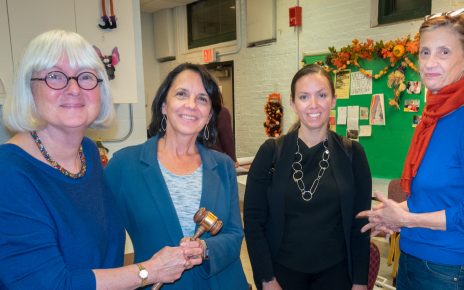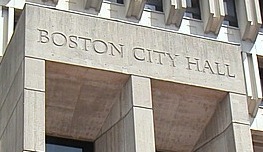City Councilor Lydia Edwards spoke to the North End / Waterfront Residents’ Association (NEWRA) about a new non-profit structure to augment city services aimed at tackling the neighborhood’s persistent trash issues. Edwards said that in her North End constituent updates, trash cleanup was the #1 cited problem. At issue, said the councilor, is that Boston’s public works resources are spread throughout the entire city, currently leaving only one hokey cleaning part-time in the North End neighborhood.
To supplement city services, Edwards is proposing a voluntary clean streets program run by a local non-profit where money raised would be able to stay in the North End. The concept is inspired by the Downtown Crossing Business Improvement District (BID) where an additional tax is paid by property owners to fund the neighborhood’s extensive daily cleaning efforts.
Using an existing non-profit(s), Edwards envisions a clean streets committee that would determine a voluntary residential and business pay-in rate in a certain geographic area that would hire hokeys to clean that area. For example, each residential unit would be asked to pay a certain monthly fee while a restaurant or business may be expected to pay a different rate depending on specific conditions.
Edwards emphasizes the program would be totally voluntary, but that she already has talked to several committed residents and business owners that are ready to sign up. In addition to hiring hokeys, the clean streets group could outsource street power washing or holiday decorating. She said that the new clean streets program could launch next Spring.
So, what’s a hokey? Check out the public works video below.




Everyone knows how dirty our neighborhood’s streets are, as well as the fact that the situation has become markedly worse over the years.
We all know the myriad reasons as to why this is the case, so I will not repeat them here.
That being said, MANY THANKS to Councilor Edwards for her proposal. 🙂
I am hopeful that there will be at least SOME improvement in comparison to the status quo.
-David Marx-
(Host of the monthly North End Public Safety Meetings with Boston District A-1 Police and contributor to this website.)
Really? We have to pay more money? The dirty streets are due to very heavy traffic by people who don’t live here- restaurant goers and tourists. Those two groups already pay into taxes through their activities here. We should be advocating for well deserved additional resources. Not the opportunity to pay for more holiday decorations that benefit- yes- restaurant goers and tourists.
Plainly stated- I think the North End is getting shorted by the City and our Councillor should advocate for us more.
Why is our neighborhood so much dirtier than any other (except maybe Chinatown but we could be tied) if we get the same resources as others? What is the difference? Our physical area is much smaller than other neighborhoods. How are the resources evenly distributed by the City? By population? Square acreage? Neighborhood identity?
One reason for so much trash on the sidewalks and streets is that there are very few trash containers. I lived in the North End from the 70’s to 1992, and I agree, there is much more trash.It’s sad to see.Can the city have more trash containers and regular emptying?.When people see a cleaner street, they won’t be tempted to just throw their trash -respect breeds respect.
KP
The concept will be supportted through voluntary and I assume, tax deductible contributions. Since local and state tax contributions cap at 10K as federal tax deductions, things like this will be the wave of the future. Those having the means can contribute. Taxpayers are already under pressure. This is away to pay directly to something for a definate result as opposed to paying more tax for what?